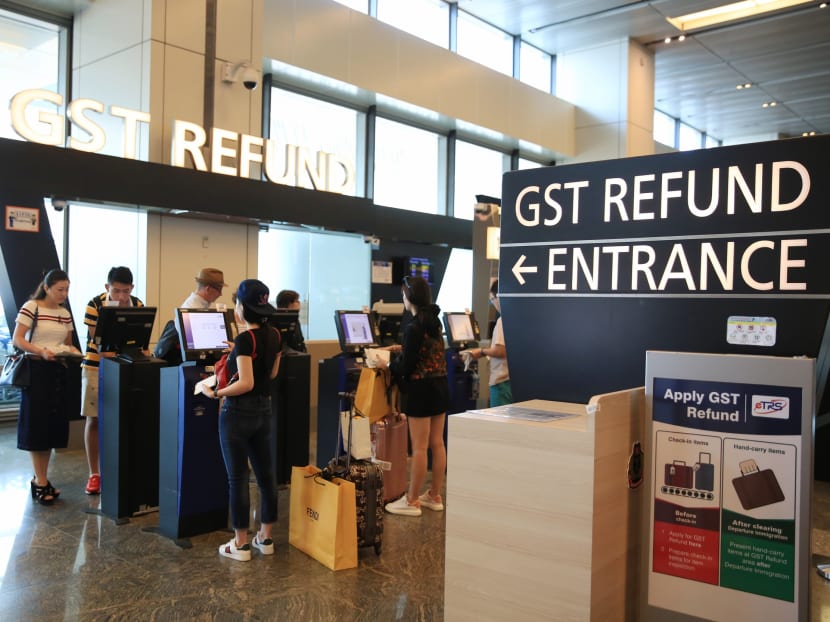GST to go up to 9%, hike expected to kick in between 2021 and 2025
SINGAPORE — The Goods and Services Tax (GST) will be raised from 7 to 9 per cent some time between 2021 and 2025, Finance Minister Heng Swee Keat announced on Monday (Feb 19) in his Budget speech.

The Government plans to raise Goods and Services Tax (GST) from the current 7 per cent to 9 per cent sometime between 2021 and 2025, said Finance Minister Heng Swee Keat on Monday (Feb 19). TODAY file photo
SINGAPORE — The Goods and Services Tax (GST) will be raised from 7 to 9 per cent some time between 2021 and 2025, Finance Minister Heng Swee Keat announced on Monday (Feb 19) in his Budget speech.
The exact timing of the hike — which has been widely anticipated in recent weeks in the lead-up to the Budget statement — depends on “the state of the economy, how much our expenditures grow, and how buoyant our existing taxes are”, Mr Heng said. “But I expect that we will need to do so earlier rather than later in the period.”
He added: “This GST increase is necessary because even after exploring various options to manage our future expenditures through prudent spending, saving and borrowing for infrastructure, there is still a gap.”
Read also
- Amid major shifts, Budget 2018 positions S’pore for the future: Heng Swee Keat
- Reserves ‘important for long-term stability’
- S’pore posts record S$9.6 billion budget surplus, thanks to ‘one-off’ factors
- Budget 2018: Key announcements and highlights
The impending GST hike will provide a revenue boost of almost 0.7 per cent of the gross domestic product each year, which “will be vital” in closing the gap. “We will continue to manage our expenditures and the need for other future revenue measures carefully, and plan ahead early for our overall revenue and expenditure needs,” he reiterated.
First introduced in April 1994, the GST was raised from 3 to 4 per cent in 2003, and then to 5 per cent in 2004. The last change was in 2007, when it was raised to 7 per cent. Similar to past GST hikes, the increase would be done in a “progressive manner”, Mr Heng said.
He stressed that the Government would continue to absorb GST for publicly subsidised education and healthcare. When the GST increase kicks in, the permanent GST Voucher scheme — introduced in 2012 — will be enhanced to cushion the impact for lower-income households and seniors, he added.
The Government disburses about S$800 million yearly from the GST Voucher Fund. This year, it will put in S$2 billion to fund these vouchers.
There will also be an “offset” package to help lower- and middle-income households tide over the GST increase when it happens. More details about the package will be provided after the timing of the hike has been determined.
RASING REVENUE WHEN NEEDED
Commenting on the latest development, economists told TODAY that setting the GST hike within the 2021 and 2025 timeframe is the Government’s way of saying that the revenue from this tax hike is not for immediate spending, but to support rising expenditure in the next decade.
Another message is that of “prudence”, because “if you find yourself with more money than expected, there is always a temptation to use it”, Dr Walter Theseira from the Singapore University of Social Sciences said.
Another anaylst said that with the need to raise revenue to support rising expenditure in areas such as healthcare, for instance, the Government is reinforcing the message that fiscal policy is not just about redistributing resources, but inter-generation trade-offs.
Senior economist Irvin Seah from DBS said: “It is only responsible for the current generation to shoulder the burden instead of passing it over to the next generation.”
Economist Song Seng Wun from CIMB Private Banking said that having a timeframe sends a signal that the Government is not out there to “unnecessarily take away the people’s money”.
And by announcing the hike before the next General Election, which must be called by January 2021, it shows that the Government is confident of being re-elected to see the hike through and that it “does not engage in populist politics and has to do what is right for the future of the (country’s) economy”, Mr Song said.
From the perspective of business owners, the disclosure of the exact GST increase might have quelled some anxiety. Economist Selena Ling from OCBC bank said that “nobody likes to be surprised” and the timeframe allows businesses to mentally prepare themselves for the tax increase.
However, Dr Theseira said that businesses might still find that the timeframe is not enough to help them in their future planning.
In the past few months, economic reports by banks such as DBS and UOB have talked about a 2 per cent GST hike, which would be rolled out progressively over the next two years.
Mr Lam Kok Shang, head of indirect tax services in KPMG Singapore, believes that a one-off increase is better than a tiered one, which will increase business compliance costs, including making changes to the accounting system twice and changing price displays on items every time the GST changes.
However, Ms Ling’s view is that a tiered-increase would best cushion the GST hike. Although there is a global cyclical upswing, the growth rates for Singapore or regional economies are not back to the figures before the 2008 financial crisis.
“There’s improved growth but it’s not as if we are back to the good old days of 2006 and 2007. So, I think baby steps are the way to go,” she explained.






